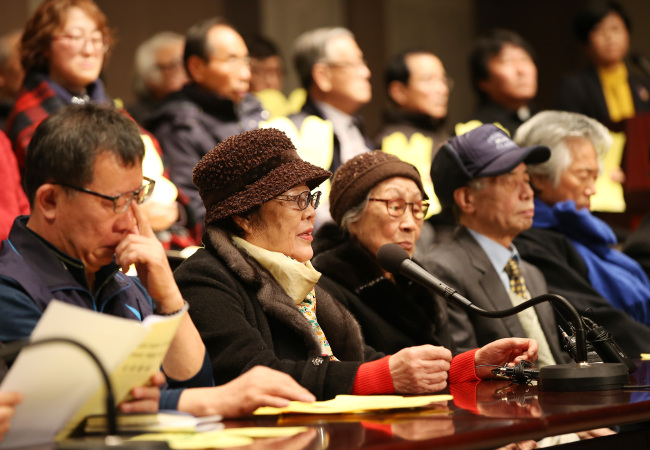Campaign launches to cancel Korea-Japan sex slavery deal
By Korea HeraldPublished : Jan. 14, 2016 - 18:18
Hundreds of progressive civic groups launched an umbrella organization on Thursday to demand Seoul and Tokyo invalidate the landmark deal over Japan’s sexual enslavement of Korean women.
The umbrella organization, which encompasses 383 civic, religious, lawyers’ and students’ groups as well as 300 individuals, announced its plan to campaign against the deal at home and abroad in a press conference held in central Seoul.
“We gathered here to invalidate the agreement, demand renegotiations with Japan and gather public support,” Kim Geum-ok, a representative for the group, said in the press briefing. “We will be at the forefront of the fight to prevent recurrence of inhumane crimes like sex slavery and win legal compensation and formal apology from Japan.”
The umbrella organization, which encompasses 383 civic, religious, lawyers’ and students’ groups as well as 300 individuals, announced its plan to campaign against the deal at home and abroad in a press conference held in central Seoul.
“We gathered here to invalidate the agreement, demand renegotiations with Japan and gather public support,” Kim Geum-ok, a representative for the group, said in the press briefing. “We will be at the forefront of the fight to prevent recurrence of inhumane crimes like sex slavery and win legal compensation and formal apology from Japan.”

Calling the Dec. 28 “comfort women” deal political collusion between Seoul and Tokyo, the groups lashed out at Japan for failing to admit to its state-led war crimes and refusing to recognize the 1-billion yen ($8.5 million) fund as legal compensation.
In the diplomatic deal defined as “final and irreversible” by both countries, Japan made an apology and agreed to provide 1 billion yen to a Korea-run foundation for the 46 surviving victims.
In return, Seoul promised not to raise the issue again in international forums and work to relocate the controversial statue symbolizing comfort women sitting in front of the Japanese Embassy in Seoul if Tokyo fulfills its commitments. The Seoul government later insisted the relocation of the comfort women statue was beyond their control, as they faced mounting criticism.
The critics also blamed the Korean government for failing to fully represent the interests of victims by foregoing the step of consulting the victims before publicizing the deal.
President Park Geun-hye’s Wednesday remarks about the diplomatic settlement in her New Year’s speech added fuel to the rage of victims and their rights’ groups.
Praising her administration for achieving what other governments had failed, Park called on the public to acknowledge that the South Korean government “made sincere efforts to reach the best deal.”
“Korean and Japan governments should have listened to us first if they were to negotiate over our problems,” said Kim Bok-dong, a 91-year-old former comfort women who attended the press briefing along with 89-year-old victim Lee Yong-soo. “Without Japan’s heartfelt apology, we will not receive the 10 billion won. We will not take even 100 billion won.”
The victims have been demanding Japan concede the legal compensation by admitting to its government’s use of sex slaves at frontline Japanese brothels during World War II. They have insisted the legal compensation come from its state budget.
Japan has attempted to indirectly compensate the victims through such privately run donation schemes as the Asia Women’s Fund set up in 1995. But it failed amid vehement opposition from the victims, who asked for formal compensation.
The victims on Wednesday said they would refuse to take the money from the Japanese government. The advocacy group for former comfort women’s rights instead plans to collect donations worth 10 billion won to assist the victims and their projects through a foundation called “Justice and Memory.”
The group will also continue its rally across the nation to form a social consensus, pressure the political realm to renegotiate the deal and set up comfort women statues around the world.
As part of the global campaign against the bilateral settlement, the representatives from Taiwan, China and Japan fighting for the victims’ rights will come together to hold a meeting on Feb. 18-19. They will also file a petition with the United Nations.
On March 1, the group will take to streets across the nation to demand Japan admit to its wrongdoing during the war, take legal responsibility and punish war criminals.
Earlier Wednesday, nearly 800 demonstrators, including some 16 female activists from across Asia and Africa, joined a weekly rally held in front of the Japanese Embassy in Seoul to criticize the deal and display their support for the victims.
Led by the Korean Council for the Women Drafted for Military Sexual Slavery by Japan, six victims attended the demonstration to renew their pledges to fight until the issue is “properly” solved.
Since the deal touted by the international community for clearing hurdles in Korea and Japan’s bilateral relations, the Japanese government has also been soothing its public sentiment by saying the deal was a “project” to help the victims. Japan’s Prime Minister Shinzo Abe reportedly refused to repeat the clauses in the settlement himself when asked by members of the opposition Democratic Party.
By Ock Hyun-ju (laeticia.ock@heraldcorp.com)
-
Articles by Korea Herald



![[Exclusive] Korean military set to ban iPhones over 'security' concerns](http://res.heraldm.com/phpwas/restmb_idxmake.php?idx=644&simg=/content/image/2024/04/23/20240423050599_0.jpg&u=20240423183955)

![[Graphic News] 77% of young Koreans still financially dependent](http://res.heraldm.com/phpwas/restmb_idxmake.php?idx=644&simg=/content/image/2024/04/22/20240422050762_0.gif&u=)



![[Pressure points] Leggings in public: Fashion statement or social faux pas?](http://res.heraldm.com/phpwas/restmb_idxmake.php?idx=644&simg=/content/image/2024/04/23/20240423050669_0.jpg&u=)










